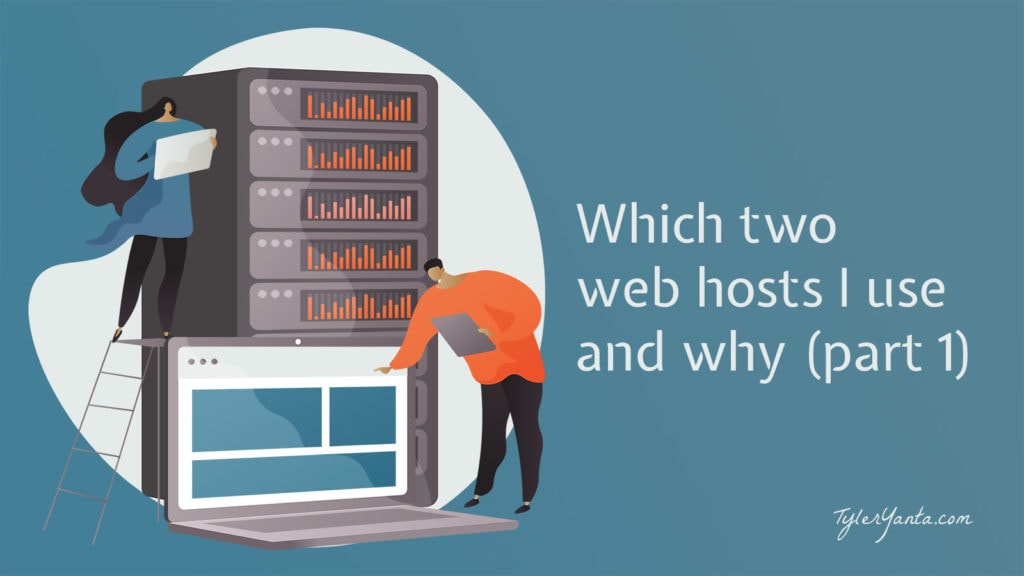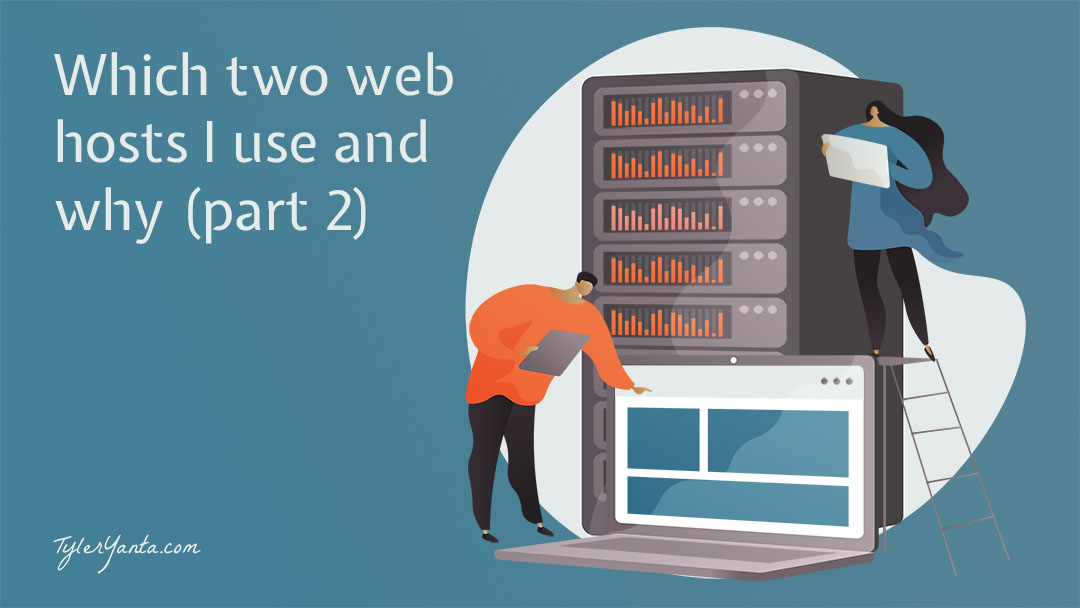Part 1 in this series listed my “must have” and “nice-to-have” features I was looking for when trying to decide which web host deserved my business.
No True ‘One-Size-Fits-All' Web Host Solution
Some may argue that my job should simply be to point my digital finger towards the ‘one-and-only solution' that I recommend. To that I say: If life were only that simple!
I figure since I have spent nearly 2 decades of ‘searching for the best host for my needs' and in the end, settled on two different hosting providers, perhaps I should share which hosts I use, why that is and which of my needs are best filled by each!

If you haven't already, may I suggest that you go back and read part 1?
Two Tales and One Lesson on Net Loss
In that installment, I promised to share a lesson I have learned the very hard way – not once, but TWICE!
Perhaps you've learned enough life-lessons and just want to see what's different about this solution. If that's you, by all means skip to the end! Otherwise, read on to find out what drove me to spend a little bit more, and in turn, save me way more in the long run.
If you are bootstrapping your business or simply trying to keep costs low, it's tempting to make a decision solely based on price. I was tempted. I took the bait. I was very sorry thereafter.
If you are bootstrapping your business or simply trying to keep costs low, it's tempting to make a decision solely based on price.
The Day Disaster Struck
The first time I was looking for a fairly priced solution that would meet my needs for offering low-cost hosting to clients who didn't have overly demanding sites. Their service worked well enough for several years, providing adequate support and an acceptable amount of planned downtime. They were more local than most other offerings so I thought I had made a good choice.
That is, until that hot day in July 2018 that now lives on in infamy: the day disaster struck. My host, as it turns out, was ill-prepared for some form of data corruption (still unclear if the cause was internal or external) that literally took down the company. All (months worth of) backups were lost. There was no recovering except for my own offline backups.
That is why I will never use a host again that doesn't offer off-site backup and/or go without an automated solution of my own.

That is why I will never use a host again that doesn't offer off-site backup
I spent weeks recovering sites. One might say “but that was out of their control”. Maybe. Or maybe they chose – or didn't have – the resources to adequately make their services more robust. In any case, lesson learned.
Or was it?
Time has a funny way of making you (well, at least me) forget.
Take 2
A few years later, I started looking for a cheap host for the purpose of (here's the irony) hosting off-site backups, dev and staging sites and the odd hobby/tinker site. I had plans of – and started working on – some lighter sites that would ideally live there a while too, until more performant hosting was required.
I stumbled on what seemed to be a too-good-to-be-true deal (red flag?) and invested the time to set everything up. I don't recall the exact sequence of unfortunate events, but shortly after a nameserver change was required. Not a big issue, I thought. But then a there was some sort of ownership change and a migration was required – and no, it wasn't automatic or seamless. Still, I convinced myself that I was saving, despite the subsequent time investment required.
But then came 2018's ‘catastrophic event‘ – take 2 – in the form of a series of storms that supposedly destroyed the building where the servers were housed.
Maybe it did, maybe it didn't. If so, I wish that on no one. If not, the cynic in me thinks “what an awfully convenient way out!”
In any case, suffice it to say everything the host had was lost, yet again. To make matters worse, I had pre-paid for a longer period of service which I was clearly not going to get.
Everything the host had was lost, yet again.
Takeaways
So the two big takeaways here are:
- Always follow the 3-2-1 backup strategy: Have at least three copies of your site on at least two different devices with at least one being offsite. For me, this means having a copy of every site I work on 1) with my current web hosts (that offer off-site backup), on my local computer and another in the cloud.
- Price cannot be the only factor when choosing a web host. The recommendation in Part 1 has affordable (but not the cheapest) well-rounded offerings that scale up seamlessly with your needs. Part 2's recommendation manages to do almost as well in all categories with some added perks of their own at an ever-so-slightly cheaper entry point.
Those other options that left me high and dry cost me more on time that I could have ever saved. Sure, those situations were extraneous, but they can happen again.
Those other options that left me high and dry cost me more on time that I could have ever saved.
The scales can also tip towards “too much time investment” if your host's support resources are inadequate. For me, being able to reach out via chat at any time is a must to save the time it would take to scour the internet for solutions.
That's why I always do considerable research before making a decision that is so foundational, literally, to my – and others' – businesses.
How can you tell if a webhost will be around for the long haul?
Here are some facts about today's recommendation that I personally found comforting:
- Prior to founding a hosting company, the team developed over 50 plugins for WordPress that have been downloaded more than 20 million times since 2011. Takeaways: this company knows WordPress and has proficient developers.
- The team has grown to 65+ people, the majority of which are developers and support agents. Takeaways: they know that support is paramount and are continually working to improve their support offerings (a progression which I have observed first-hand) and continue to add features to their custom-built management platform and included ‘premium' plugins.

Managed WordPress Hosting: On-trend Before it Exploded
My second web host recommendation was on-trend before the trend really took off: given their experience developing WordPress plugins, they decided to focus completely on managed hosting for WordPress, with the goal of making site management and maintenance as painless as possible so site owners can focus on their business.
Today, more and more companies are hopping on the “managed WordPress cloud hosting” train, which benefits us all. Well, unless you don't use WordPress. If that's your situation then I'll simply refer you back to Part 1 of this article as that recommendation can run pretty much anything.
My Second Web Host Use Case
The use case that I was looking to fill was to have an affordable, managed cloud hosting provider that knew WordPress inside-and-out. That is to say, a solution that was tuned for performance with more dynamic sites in mind (like eCommerce, lms or membership sites, etc.).
A Quick Comparison
The key differences between my first recommendation and this one are:
- This one is WordPress only
- For performance and security reasons, it's one site per provisioned “server” whereas option 1 let you install however many you thought it could handle. The benefit here is complete isolation for each hosted website.
- The “AI Recreation Assistant” that lets you re-create any existing WordPress, Wix, Squarespace etc. site over to WordPress and their hosting with a few clicks.
- Full site-management tools for keeping WordPress core and plugins up to date and backed up as frequently as every hour. (You can centrally manage sites on other hosts as well!)
- Other included perks such as a built-in editor based on Elementor (which you do not have to use), Malware removal, image optimization service and official multisite support
- The de-emphasis of platform. Where my first recommendation gives you many options, here you don't have to worry about that decision beyond choosing the closest of 12 datacenter locations to your audience. All sites are securely hosted on Google's cloud infrastructure.
So in reality, there's everything on my original “must-have list” except taking a different “buy the number of sites you need” model vs. getting server space that you can load up with whatever you like, then scale if necessary. I have to say, there's something to be said for the simplicity of “build one site here and you'll likely have enough resources to do anything WordPress enables you to do”.
On that note, there really aren't any scaling options other than number of sites (and subsequent required storage space / total visitors). As simple as it is with my first recommendation to slide a slider and scale, this option removes that decision process (when, how high, etc.) entirely.
Where this web host excels:
- The claim is “Mobile & Desktop 90+ PageSpeed Score” and in practice, when using their optimization plugin, that's what's been delivered.
- The complete experience: everything from one-click migration to built-in page builder based on Elementor to dozens of plugins at your disposal, site management & backup tools at the ready go above and beyond most other host offerings.
- Come for the hosting, partake in the rest – or not. It's completely optional! You're not forced into anything.
- The majority of the management features allow you to centrally manage sites hosted anywhere.
- The AI assistant could help speed the process of re-creating sites, if that's a thing you do.
Where it could use some work:
- If you're just starting out, the in-house plugins offer some premium features that you might otherwise have to pay for. Personally, I've opted to use my own library of paid plugins.
- I've had some issues with the optimization plugin but a new version was just released so I'll have to revisit.
- 24/7 chat support is great, however early on I learned to think of it more as “level 1 support”. That may be all most people need but when I run into an issue, it seems like it often has to be handed over to “the developers” which requires an email answer and longer wait time. That said, I usually hear back within 24 hours, often less.
- The tide may be turning here as they recently started a Slack channel that has a dedicated support staff, although this is understandably not an option on the lower tiers. Even so, I would say the number of times I have been passed off to developers has decreased over the years as their staff get more experience.
- There are some little tweaks they could do to their management platform like being able to update premium plugins, providing links to changelogs, seeing an aggregate view of all plugins needing updates across sites, highlighting which have known vulnerabilities and supporting multisite staging sites. Some of those are clearly niche requests, and yet I've been told they're on the roadmap!
My Second Web Hosting Recommendation
So who also gets my whole-hearted recommendation for cloud hosting? 10Web.

“Second” sounds so… secondary. I really do feel that – while there is certainly overlap – they have differing use cases and potentially target different audiences.
I have been a 10web customer since 2019 and have continued to move sites over to their platform (thankfully they make it easy!) The company continually improves their offerings and is open to input, as any good company should be. There is a lot on offer for a very affordable amount; and it's take-it-or-leave-it. None of their additional services are forced on you. So which do you choose?
If you're more the DIY type that likes to tinker:
…choose Cloudways (see part 1 in this series)
If you appreciate simplicity:
…and a platform that lets you do most everything in one place while giving you the flexibility to do your own thing if you choose, then go with 10web.
Either way, you shouldn't be disappointed!
With 1-click migration and a full two weeks (14 days) to explore all the platform has to offer, you can start your next project, migrate an existing one or simply try the management tools on site(s) you host elsewhere:
I hope these two articles have helped you find a host that deserves your business and maybe the time spent reading them will be recouped by avoiding the mistakes I've made along the way.
<< Back to Which Two Web Hosts I Use and Why – Part 1.

